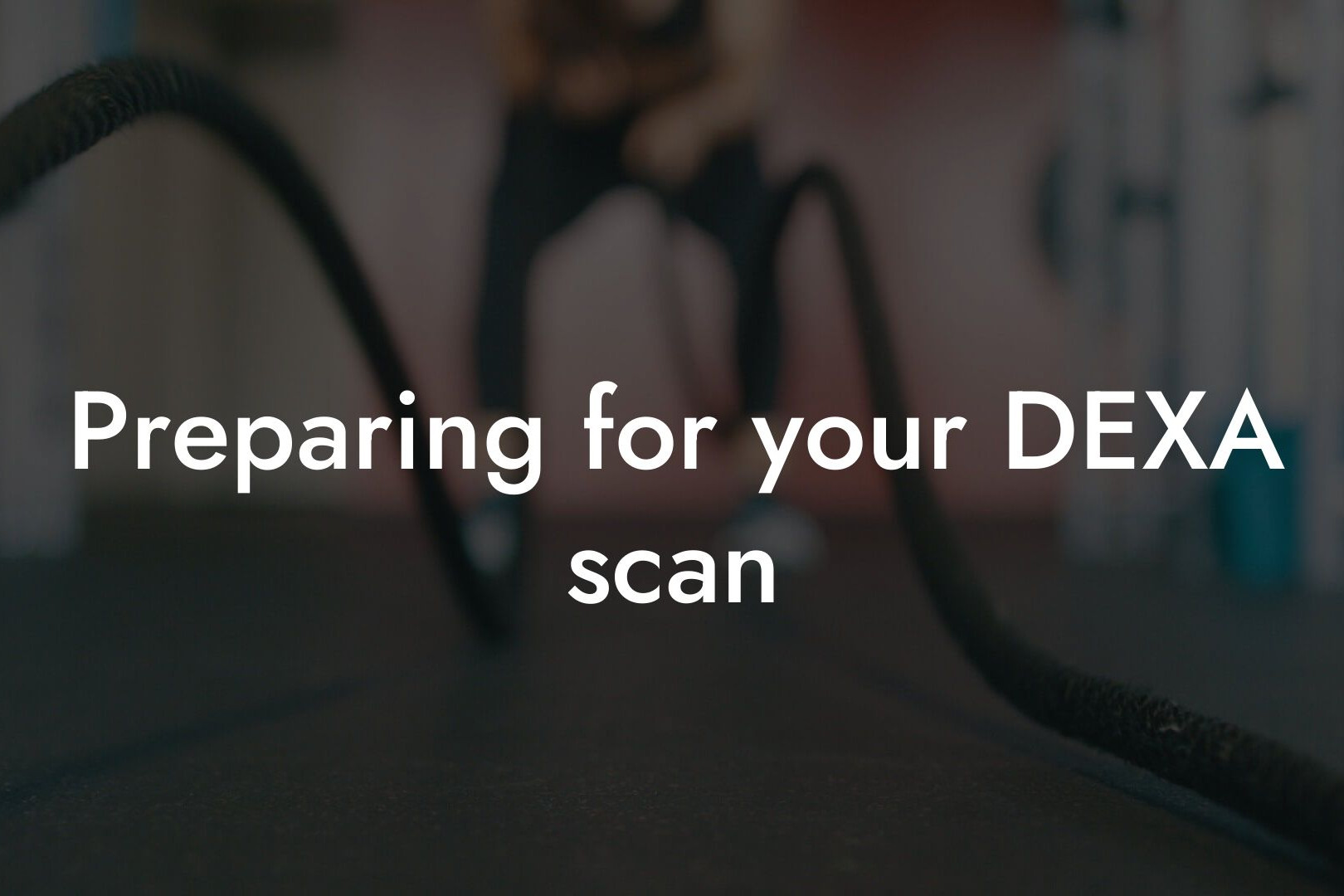A DEXA (Dual-Energy X-ray Absorptiometry) scan is a non-invasive, pain-free medical imaging test that measures bone density, body composition, and body fat percentage. It is commonly used to diagnose osteoporosis, monitor bone loss, and track changes in body composition over time. At Tano Performance Group, we utilize DEXA scans as a valuable tool to provide high-earning professionals with a comprehensive body assessment, helping them achieve their physical goals and improve their overall well-being.
Table of Contents
- How Does a DEXA Scan Measure Body Fat?
- What Are the Benefits of Measuring Body Fat with a DEXA Scan?
- How Does a DEXA Scan Compare to Other Body Fat Measurement Methods?
- What Are the Different Types of Body Fat?
- What Are the Health Risks Associated with Excess Body Fat?
- How Can I Use DEXA Scan Results to Improve My Body Composition?
- Frequently Asked Questions
How Does a DEXA Scan Measure Body Fat?
A DEXA scan uses a low-level X-ray beam to measure the density of different tissues in the body, including bone, lean tissue, and fat tissue. The scan is performed while lying down on a flat table, and the entire process typically takes around 10-15 minutes. During the scan, the X-ray beam passes through the body, and the absorption of the beam is measured by a detector. The degree of absorption varies depending on the density of the tissue, allowing the scanner to distinguish between different types of tissue.
The DEXA scan provides a detailed breakdown of body composition, including:
- Fat mass: The total amount of fat in the body, including visceral fat (fat around the organs) and subcutaneous fat (fat beneath the skin).
- Lean mass: The total amount of non-fat tissue in the body, including muscle, bone, and water.
- Bone density: The density of the bones, which can indicate the risk of osteoporosis or fractures.
What Are the Benefits of Measuring Body Fat with a DEXA Scan?
Measuring body fat with a DEXA scan offers several benefits, including:
- Accurate measurements: DEXA scans provide highly accurate measurements of body fat percentage, allowing individuals to track changes over time.
- Comprehensive body composition analysis: DEXA scans provide a detailed breakdown of body composition, including fat mass, lean mass, and bone density.
- Identification of health risks: Excess body fat, particularly visceral fat, is associated with an increased risk of chronic diseases, such as diabetes, cardiovascular disease, and certain types of cancer.
- Personalized fitness and nutrition planning: With accurate body fat measurements, individuals can create personalized fitness and nutrition plans tailored to their specific needs and goals.
How Does a DEXA Scan Compare to Other Body Fat Measurement Methods?
DEXA scans are considered the gold standard for measuring body fat percentage due to their high accuracy and precision. Other methods, such as:
- Hydrostatic weighing: This method involves measuring body density by weighing an individual underwater. While accurate, it can be time-consuming and inconvenient.
- Skinfold measurements: This method involves measuring the thickness of skin folds at specific points on the body. While inexpensive, it can be inaccurate and is limited to measuring subcutaneous fat.
- Bioelectrical impedance analysis (BIA): This method involves measuring the resistance of an electrical current as it passes through the body. While convenient, it can be inaccurate and is affected by factors such as hydration levels.
cannot match the accuracy and comprehensiveness of a DEXA scan.
What Are the Different Types of Body Fat?
There are two main types of body fat:
- Subcutaneous fat: This type of fat is located just beneath the skin and is visible as "pinchable" fat. It is generally considered harmless and can even provide some health benefits, such as insulation and energy storage.
- Visceral fat: This type of fat is located around the organs in the abdominal cavity and is associated with an increased risk of chronic diseases, such as diabetes, cardiovascular disease, and certain types of cancer. Visceral fat is often referred to as "hidden" fat because it is not visible externally.
What Are the Health Risks Associated with Excess Body Fat?
Excess body fat, particularly visceral fat, is associated with an increased risk of several chronic diseases, including:
- Diabetes: Excess body fat can lead to insulin resistance, a precursor to type 2 diabetes.
- Cardiovascular disease: Excess body fat can increase the risk of heart disease, high blood pressure, and stroke.
- Certain types of cancer: Excess body fat has been linked to an increased risk of certain types of cancer, including breast, colon, and kidney cancer.
- Osteoarthritis: Excess body fat can put additional strain on joints, leading to osteoarthritis and other mobility issues.
How Can I Use DEXA Scan Results to Improve My Body Composition?
With the accurate and comprehensive body composition data provided by a DEXA scan, individuals can create personalized fitness and nutrition plans tailored to their specific needs and goals. This may include:
- Setting realistic goals: With accurate body fat measurements, individuals can set realistic goals for fat loss and muscle gain.
- Creating a personalized workout plan: A DEXA scan can help identify areas of the body that require more attention, such as building lean muscle mass or reducing visceral fat.
- Developing a healthy nutrition plan: A DEXA scan can help individuals understand their macronutrient needs and create a balanced diet that supports their fitness goals.
- Monitoring progress: Regular DEXA scans can help individuals track changes in body composition over time, allowing them to adjust their fitness and nutrition plans as needed.
In conclusion, DEXA scans are a valuable tool for measuring body fat percentage and providing a comprehensive body composition analysis. At Tano Performance Group, we are committed to helping high-earning professionals achieve their physical goals and improve their overall well-being. With the accurate and detailed information provided by a DEXA scan, individuals can create personalized fitness and nutrition plans, track changes over time, and achieve optimal body composition.
Frequently Asked Questions
What is a DEXA scan?
A DEXA (Dual-Energy X-ray Absorptiometry) scan is a non-invasive medical test that measures bone density and body composition, including body fat percentage. It's commonly used to diagnose osteoporosis, but it's also an excellent tool for tracking body fat and lean mass.
How does a DEXA scan work?
A DEXA scan uses X-rays to measure the density of your bones and body tissues. It emits two X-ray beams with different energy levels, which are absorbed by your body at different rates. The machine then calculates the difference in absorption to determine your bone density and body composition.
What can I expect during a DEXA scan?
During a DEXA scan, you'll lie on a flat table, and the machine will slowly pass over your body. The entire process usually takes around 10-15 minutes. You'll need to remain still and hold your breath for a few seconds during the scan. It's a painless and comfortable procedure.
Is a DEXA scan safe?
Yes, DEXA scans are extremely safe. They use very low levels of radiation, equivalent to a few days of natural background radiation. The scan is also non-invasive, meaning it doesn't require any injections, surgery, or other invasive procedures.
How accurate are DEXA scans?
DEXA scans are highly accurate, with an error margin of around 1-2% for body fat percentage measurements. They're considered the gold standard for measuring body composition and bone density.
What can a DEXA scan tell me about my body fat?
A DEXA scan provides a detailed breakdown of your body composition, including your percentage of body fat, lean mass, and bone mass. It can also identify areas where you may be storing excess fat, such as your hips, thighs, or abdomen.
Can a DEXA scan help me track my progress?
Absolutely! DEXA scans are an excellent tool for tracking changes in your body composition over time. By comparing scan results, you can see how your diet and exercise routine are affecting your body fat percentage and lean mass.
How often should I get a DEXA scan?
The frequency of DEXA scans depends on your individual goals and needs. If you're trying to lose weight or improve your body composition, you may want to get scanned every 3-6 months to track your progress. If you're looking to maintain your current physique, an annual scan may be sufficient.
Can I get a DEXA scan if I'm pregnant or breastfeeding?
It's generally not recommended to get a DEXA scan during pregnancy or breastfeeding, as the radiation exposure may pose a risk to the fetus or baby. However, if you have a medical condition that requires a DEXA scan, your doctor will weigh the benefits and risks and make a recommendation.
Are DEXA scans only for athletes or bodybuilders?
No, DEXA scans are beneficial for anyone interested in tracking their body composition and overall health. Whether you're a professional athlete, a fitness enthusiast, or simply looking to improve your health, a DEXA scan can provide valuable insights and help you achieve your goals.
Can I get a DEXA scan at my doctor's office?
Some doctor's offices may offer DEXA scans, but it's more common to find them at specialized medical imaging centers or fitness and wellness facilities. You can search online for providers in your area that offer DEXA scans.
How much does a DEXA scan cost?
The cost of a DEXA scan varies depending on the provider, location, and type of scan. On average, you can expect to pay between $50 to $200 for a basic scan. Some providers may offer package deals or discounts for multiple scans.
Will my insurance cover a DEXA scan?
Insurance coverage for DEXA scans varies depending on your policy and provider. Some insurance plans may cover scans for medical purposes, such as diagnosing osteoporosis, but may not cover scans for fitness or wellness purposes. Check with your insurance provider to determine coverage.
How do I prepare for a DEXA scan?
To prepare for a DEXA scan, avoid eating a heavy meal or consuming caffeine within 2-3 hours of the scan. Wear loose, comfortable clothing and avoid wearing metal objects or jewelry that may interfere with the scan.
What if I have metal implants or devices?
If you have metal implants or devices, such as hip or knee replacements, pacemakers, or artificial joints, inform your scan provider beforehand. They may need to take special precautions or use alternative scanning methods.
Can I get a DEXA scan if I'm under 18?
DEXA scans are typically recommended for individuals 18 years and older. However, in some cases, a doctor may order a scan for a minor if there's a medical necessity. Parental consent is usually required for minors.
How does a DEXA scan differ from other body fat measurement methods?
DEXA scans are more accurate than other body fat measurement methods, such as bioelectrical impedance analysis (BIA) or skinfold measurements. They provide a more detailed breakdown of body composition and can identify specific areas of fat storage.
Can I use a DEXA scan to track my muscle mass?
Yes, a DEXA scan can provide information on your lean mass, which includes muscle mass. This can be helpful for athletes or individuals looking to build muscle and track their progress.
How does a DEXA scan measure bone density?
A DEXA scan measures bone density by emitting X-rays that pass through your bones. The machine then calculates the density of your bones based on the amount of X-rays absorbed. This information is used to diagnose osteoporosis or osteopenia.
What if I have osteoporosis or osteopenia?
If you're diagnosed with osteoporosis or osteopenia, your doctor will work with you to develop a treatment plan to improve your bone density and reduce the risk of fractures. This may include medication, lifestyle changes, or exercise programs.
Can a DEXA scan help me improve my overall health?
Absolutely! A DEXA scan provides valuable insights into your body composition and bone density, which can help you make informed decisions about your diet, exercise, and lifestyle. By tracking your progress and making positive changes, you can improve your overall health and reduce the risk of chronic diseases.
How do I find a reputable DEXA scan provider?
Look for providers that use calibrated DEXA machines and have experienced technicians who can interpret the results accurately. You can also ask for referrals from your doctor or fitness professional, or check online reviews to find a reputable provider in your area.
Here are some related articles you might love...
- How often should you get a DEXA scan?
- Preparing for your DEXA scan
- Benefits of DEXA scans for professionals
- DEXA scans for athletes vs general population
- What is a DEXA scan?
- Understanding DEXA scan results
- DEXA scan vs other body composition tests (e.g., BMI, calipers)
- Cost of a DEXA scan: Is it worth it?
- Accuracy of DEXA scans
Zak Faulkner
Zak Faulkner is a leading authority in the realm of physical health and body composition analysis, with over 15 years of experience helping professionals optimise their fitness and well-being. As one the experts behind Tano Performance Group, Zak has dedicated his career to providing in-depth, science-backed insights that empower clients to elevate their physical performance and overall health.
With extensive knowledge of DEXA technology, Zak specializes in delivering comprehensive body assessments that offer precise data on body fat, muscle mass, bone density, and overall physique. His expertise enables individuals to make informed decisions and achieve their fitness goals with accuracy and confidence. Zak’s approach is rooted in a deep understanding of human physiology, combined with a passion for helping clients unlock their full potential through personalised strategies.
Over the years, Zak has earned a reputation for his commitment to excellence, precision, and client-focused service. His guidance is trusted by top professionals who demand the best when it comes to their health. Whether advising on fitness programs, nutritional strategies, or long-term wellness plans, Zak Faulkner’s insights are a valuable resource for anyone serious about taking their health and fitness to the next level.
At Tano Performance Group, Zak continues to lead our Content Team revolutionising how professionals approach their physical health, offering unparalleled expertise that drives real results.




